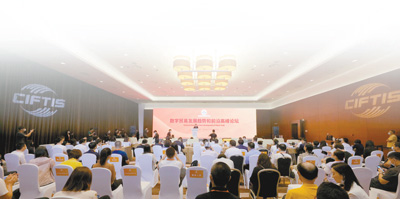The Summit Forum on Trends and Latest Developments of Digital Trade was held on Saturday at the China National Convention Center on the sidelines of the 2020 China International Fair for Trade in Services (CIFTIS).

Photo: China Economic Weekly
Xiao Yaqing, head of China’s Ministry of Industry and Information Technology, gave an opening speech at the summit. He summarized that the development of China’s digital economy has been elevated to a new level as a result of the joint efforts of all sectors of society. In the meantime, the foundation for the digital economy is more solid and developing at a faster pace, with international cooperation forging ahead steadily.
Xiao said promoting the development of digital economy to tackle challenges brought by COVID-19 and easing downward pressure on economic development is increasingly important.
Ji Lin, chairman of the Beijing Municipal Committee of the CPPCC, emphasized the importance of popularizing digital solutions and digital trade, and said these two things are capable of giving new impetus to economic recovery and transforming the everyday lives of ordinary citizens.
Ji said that Beijing will announce a “1+3” policy scheme to boost the innovative development of the digital economy on Monday to specify the focus and direction of developing the digital economy in the capital city, which he believed will serve as a good example for the development of the digital economy nationwide. In the future, Beijing will push the development of high-quality demonstration zones for digital trade to promote the production and trade of block-chain technology, artificial intelligence and big data.
Huai Jinpeng, academician from Chinese Academy of Sciences and the deputy chairman of China Association for Science and Technology, said digital trade is a symbol of the digital era, a sign of technological empowerment, and the direction of future trade development. Digitization, networking and artificial intelligence are ascendant, and it is necessary to accelerate the service sector's increasingly dominant role in the economy.
He also underscored that in the process of global digitization, traditional small- and medium-sized enterprises and vulnerable groups should not be ignored. It is necessary to support young people to innovate and start businesses, bridge the digital divide, advocate inclusiveness, and encourage open cooperation, he added.
“With the in-depth application of modern information technology on a global scale and the rapid development of the digital economy, Internet-based digital trade has flourished, driving the acceleration of the global innovation chain, industrial chain and value chain,” said Wang Bingnan, vice minister of China’s Ministry of Commerce.
He noted that on the one hand, digital trade can drive the digital transformation of traditional industries and extend the high end of the global value chain. In addition, digital technology has brought disruptive innovations, spawning a large number of new forms and models of trade, and greatly improved the status of the global value chain as a whole.
Zhao Jiaming, deputy editor-in-chief of the People’s Daily, stressed that China in recent years has insisted on supply-side structural reforms to promote the integrated development of the real economy and the digital economy, and further promoted the deep integration of the Internet, big data, and artificial intelligence with the real economy.
“As a platform for information exchange, media is also one of the important subjects in the field of service trade,” Zhao added. “The media plays an important role in promoting the exchange of information on global commerce and trade and promoting the development of digital trade.”
Many other guests from academic circle also made keynote speeches, offering insightful thoughts on developments in post-pandemic digital trade.
Joseph Stiglitz, a Nobel laureate in economics and former senior vice president of World Bank, said that with the development of the economy and the acceleration of digitization, digital trade will grow even faster. But he also pointed out some obstacles to digital trade, like monopoly, privacy, and nationalistic mentalities.
“The Chinese economy has entered a new phase of development featuring a dual cycle. Fundamentally speaking, the basics of the dual-cycle development phase are built on two wheels. One is the Chinese domestic market and production factors and the other is high-quality opening-up,” said Li Daokui, the director of Center for China in the World Economy of Tsinghua University at the summit.
Business circle guests such as Tencent Chief Operation Officer Ren Yuxin, Qualcomm China Chairman Meng Pu, and Baidu Chief Technology Officer Wang Haifeng also gave speeches and discussed the digital economy.
During the summit, a report on the development of the digital trade index of the Belt and Road was published, and a platform for promoting integration of technology and the economy was also launched.
In the post-epidemic era, the development of digital trade plays a major role in the recovery of the global economy. The successful convening of this summit forum has set up a platform for dialogue, communication and cooperation among the stakeholders in global digital economies.


